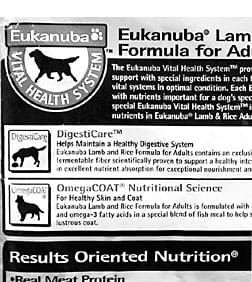With hundreds of dog foods on the market, many of them similar in terms of ingredients and nutritional value, the factor that determines which one gets bought is how well the manufacturer can convince the consumer that its food is superior to the others. Most of the time, the only place they can accomplish this is at the point of sale, where the only information available is on the label itself.
Lately, the label game has heated up. The claims being made range from the subtle to the ridiculous, and truth is sometimes stretched to its outermost limits – or beyond. The consumer must be wary and consider exactly what the claims actually mean, given the way they are worded. For instance, I’ve seen foods that claim to be “nutritional,” which is meaningless in this context, though possibly close enough to “nutritious” to fool a naïve consumer.
Abject adjectives and nonsense nouns

One of the most common ploys is to use words like “higher,” “better,” “best,” “superior,” and “more” without making a specific comparison. For instance, Science Diet Canine Maintenance claims it has “higher levels of Vitamins C & E,” but what they are higher than is not specified. Are they higher than other foods? Which other foods? Or are they higher than the last formulation of Science Diet Canine Maintenance?
Iams Chunks for adult dogs states, “Now more chicken per bowl.” More than what? (Because this statement includes the word “Now,” it probably means there is currently more chicken per bowl than Iams Chunks used to have. This claim is only allowed for six months, according to regulations on “new and improved” label claims.) Pedigree, you will be glad to know, is “now more nutritious.” Does this mean it wasn’t nutritious before?
Eukanuba wins hands-down for the best trademarked, registered (and made-up) catch phrases on their labels. Their “Eukanuba Vital Health System™” includes a “DigestiCare™” component as well as “OmegaCOAT® Nutritional Science,” resulting in “Results Oriented Nutrition®.” Throw in tinted windows and anti-lock brakes, and you’ve got yourself a deal!
I also like the ultra-sincere “letter to concerned dog owners” that Bil-Jac uses on its label, touting its “nutritional integrity.”
Bad science
Dog food companies are very scientific these days. VitaRX is “Scientifically engineered,” Nutro is “Scientifically balanced,” and Premium Edge says that its trademarked seals “mean that your pet is receiving the science of complete and balanced pet nutrition.”
Purina Dog Chow states that “each ingredient is selected for its role in delivering the 36 key nutrients dogs require.” This makes sense, because the standard nutrient profiles list 36 separate nutrients that must be present. In contrast, all Science Diet formulas contain “at least 50 nutrients from high quality ingredients.” What are the other 14 nutrients? Do dogs really need them? Who knows?
Authority Adult Chunks says that its New Zealand lamb is an “excellent source of high quality protein” and that it “supplies calcium and phosphorus for strong bones.” This is technically true – lamb contains all the essential amino acids for dogs, and it does contain both calcium and phosphorus. However, lamb is a poor source of taurine compared to poultry and fish; and like all meat, contains an extremely unbalanced ratio of calcium (less than 59 mg per pound) to phosphorus (762 mg per pound). Inferring that lamb is a significant source of calcium is a very big stretch.
Human appeal
Obviously, the pet food makers are well aware of the trends in human nutrition, and they are happy to work all the same angles as human food makers. For instance, the American consumer’s obsession with body image has not gone unnoticed. ProPlan illustrates body condition scoring, so you can tell if your Pug is too pudgy. Several foods emphasize that they do not contain “excess calories” that are evidently lurking in other brands.
Not surprisingly, many pet food manufacturers are suddenly making much ado about antioxidants, which have been big news in human nutrition. Many of Science Diet’s labels feature a banner with the words, “Superior* Antioxidant Formula;” the asterisk refers to a box directly below noting, “*Higher levels of vitamin C & E promotes (sic) healthy immune systems.”
What goes in…
The quantity and quality of stool is still a popular subject on dog food labels. Numerous foods pledge smaller, firmer stools, including Petsmart’s Authority, Eukanuba, and ProPlan. Nutro promises “guaranteed smallest stool volume.”
But my favorite is Nature’s Recipe, because (according to the label) if your dog eats that food, he will have “small, firm, easy to clean stools.”
When you eat fiber, do you produce “smaller, firmer stools”? Sorry to ask such a personal question, but according to the label of Premium Edge, that’s the result of including beet pulp – what they call “an excellent source of fiber for your pet” – in their foods. According to my medical texts, dietary fiber increases fecal weight, softness, and volume. It also results in an increased frequency of defecation.
What do choosy shoppers do?
Obviously, dog food makers didn’t invent the art of prevarication. Savvy consumers understand that most label claims must be considered no more than entertaining reading. When selecting a food, as always, your dog’s appearance, weight, energy level, coat quality, and appetite are the best indicators of a food’s true digestibility, quality, and compatibility with his individual needs.
Also With This Article
Click here to view “Dog Food Guaranteed Analysis: Truth on the Label”
-By Jean Hofve, DVM
Dr. Jean Hofve is the Companion Animal Program Coordinator for the Animal Protection Institute, located in Sacramento, California.






